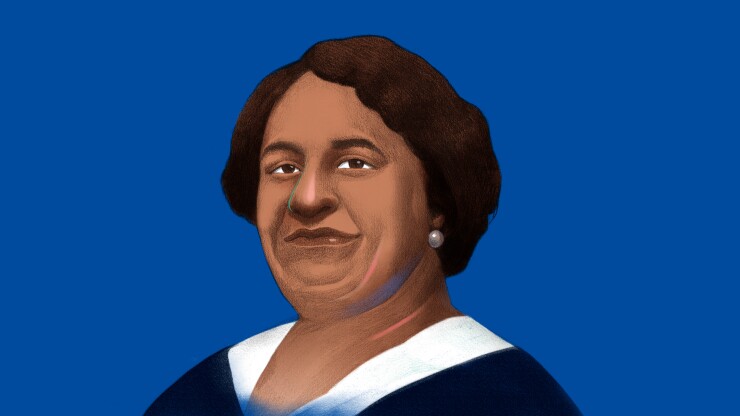More than a century ago, Maggie Lena Walker made history as the first African American woman to charter a bank. The speech she made announcing her vision for the institution would resonate with many professionals in wealth management and other financial services today.
"Let us put our moneys together; let us use our moneys; let us put our money out at usury among ourselves and reap the benefit ourselves. … Let us have a bank that will take the nickels and turn them into dollars," she said.
Walker turned the group around: Under her leadership, it went from near ruin to reaching 100,000 members in 24 states. At a time when Jim Crow laws were removing Black Americans' civil rights, Walker pursued a three-pronged strategy that leveraged entrepreneurship as a means to uplift Black Americans. The order launched a bank, the St. Luke Penny Savings Bank; a newspaper, the St. Luke Herald; and a retail store, the St. Luke Emporium.
Walker's career provides an example of a legendary figure known just as much for her outspoken activism as for her pragmatism in working for change within the economic system.
When she died at 70 years old in 1934, Monument Avenue in her hometown of Richmond, was paying tribute to Confederate generals in one of the most prominent examples of the "Lost Cause" movement. Those statues no longer appear on the avenue But Walker's home on Richmond's East Leigh Street is
"Her work and mission are rooted in this activism that changed her community. It changed the way we think about banking," Chloe McKenzie, the founder of a nonprofit organization devoted to closing the racial and gender-based wealth gap,
As the daughter of a formerly enslaved woman, Walker navigated tragedy, financial hardship and health problems on the way to her many achievements. She lost her father when she was 12 years old in a mysterious suicide that may have been a murder and helped her impoverished mother start and run a laundry business. Much later, her son shot and killed her husband when he thought an intruder had entered their home late at night. She also operated from a wheelchair during the last decade of her life due to diabetes.
Yet Walker overcame those struggles, emerging as one of the initiators of a 1904 boycott of segregated Richmond streetcars, the founder of local chapters of the NAACP and the Council of Colored Women and a strong voice for women's suffrage. After the ratification of the 19th Amendment in 1920, Walker led
The St. Luke Penny Savings Bank opened in 1903. Within 17 years it had financed
Monuments in Richmond, schools named for Walker there and in Brooklyn, New York, and streets labeled in her honor in Virginia's capital city and in Newport News serve as reminders of Walker's legacy. The FDIC has referred to her as "
The opening of an article about her from the
"Maggie Lena Walker was one of the most important Black businesswomen in the nation, and today too few people have heard of her," author Crystal Marie Moten wrote.
Read the other stories in this series:






